Niche edits are links you insert into existing content, which is why we call them link insertion (or editorial links).
In the article, we review 5 excellent niche edit services, focusing on their unique selling points, pricing, and customer reviews.
You will also learn answers to frequently asked questions about niche edits. Like, “How many links should you acquire every month?” or “How to choose the right niche edit service for your business?”
Let’s dive in!
Comparison of Niche Edit Link Services (2025)
| Service | Service Type | Clients | Price | Reviews |
| Editorial.Link | Fully-managed | SaaS, Tech, B2B brands (e.g., NordVPN, PandaDoc, Belkins) | $350 per link ($1750 for 5 links) | Clutch 5/5 |
| INSERT.LINK | Link marketplace | Experienced SEOs, budget-conscious users, and those needing control | From $10 per link | DesignRush 4.7/5 |
| FatJoe | Fully-managed | SEO agencies and marketers looking for DR-based link options | From $83 (DR10+) | Trustpilot 4.8/5 |
| RhinoRank | Fully-managed | 2,500+ SEO agencies | From $55 per link | Trustpilot 4.7/5 |
| StellarSEO | Fully-managed | Businesses and marketing/SEO agencies | $225 per link (single tier) | Clutch 5/5 |
1. Editorial.Link
Editorial.Link is a premium agency specializing in building high-impact niche edits, particularly for SaaS, tech, and B2B clients, like NordVPN, PandaDoc, and Belkins.
We’ve built a reputation for securing placements on genuine, high-authority business websites and industry blogs — many of which don't sell links.
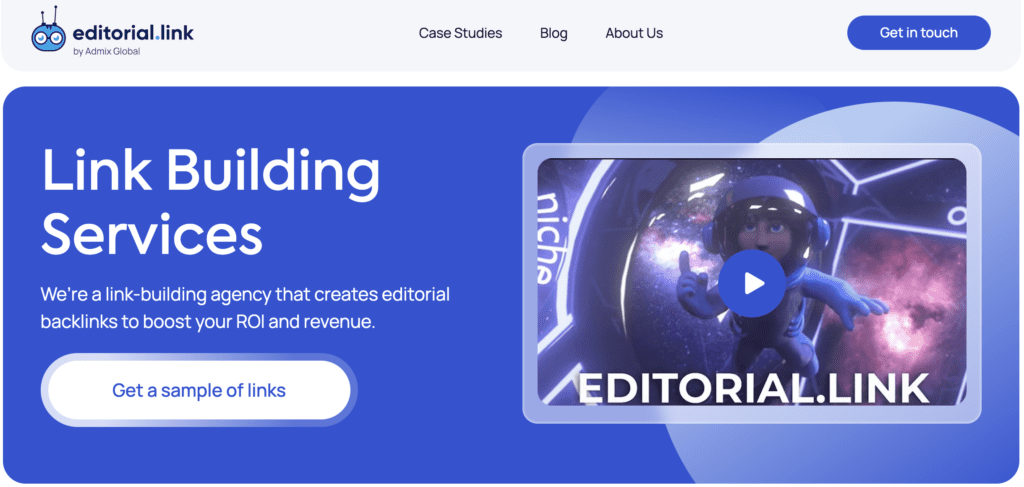
A key benefit is our flexible pricing, which starts from $1750 for five links ($350 per link).
Uniquely, this price isn't dependent on Domain Authority (DA) or Domain Rating (DR) metrics; a DR80 link costs the same as a DR60.
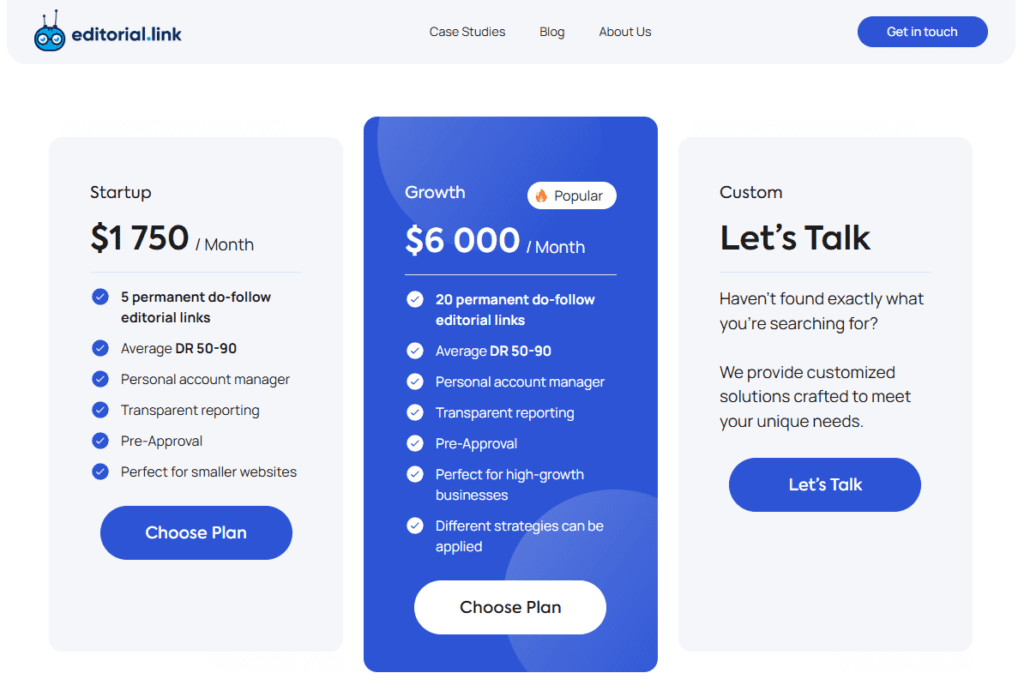
Our clients also appreciate the ability to pre-approve link placements and a link replacement guarantee, which adds a layer of security and control.
You can explore our client reviews on our Clutch profile.

2. INSERT.LINK
For those who prefer a more hands-on approach or are working with tighter budgets, INSERT.LINK offers a compelling DIY alternative in the niche edits space.
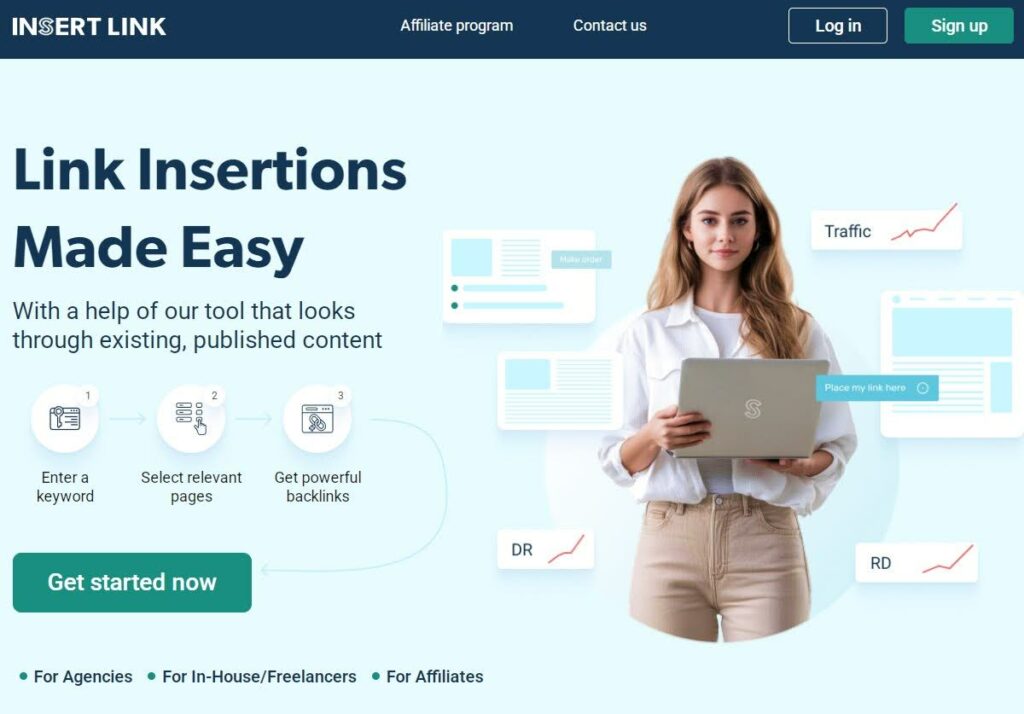
This platform functions as a vast marketplace, providing access to an impressive database of over 50 million pages where users can find opportunities for both niche edits and guest posts.
Its primary appeal? Affordability.
With link prices starting as low as $10, it’s an accessible option for small businesses or SEOs needing scalable solutions without hefty retainers.
While this model requires more SEO know-how to identify the best opportunities, it offers significant control and value.
Although relatively new, INSERT.LINK is gaining traction. You can check out its profile and client feedback on DesignRush.

3. FatJoe
FatJoe is a widely recognized name in the SEO services industry, and their niche edits service is a popular choice for small and medium-sized businesses.
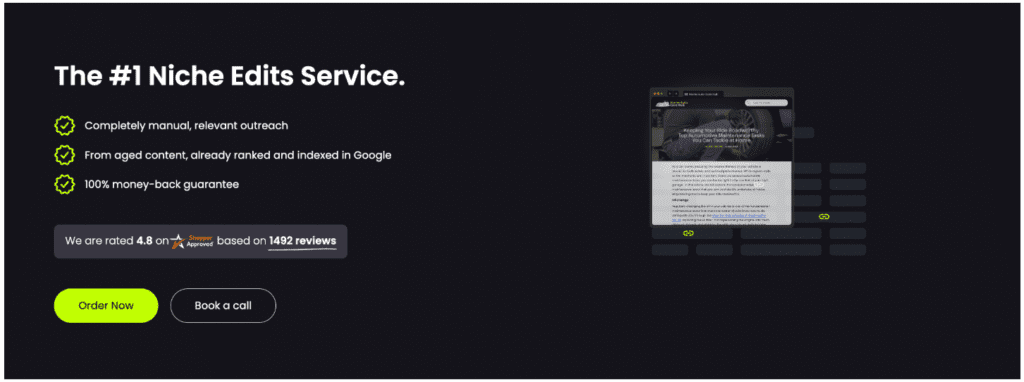
FatJoe uses a manual outreach process to secure these placements, ensuring relevance and quality.
FatJoe’s pricing for niche edits is tiered based on the Domain Rating (DR) of the linking site, starting from $83 for a DR10+ placement and going up to $528 for a DR60+ link.
This DR-based pricing is common in the industry and allows buyers to select links according to their budget and authority requirements.
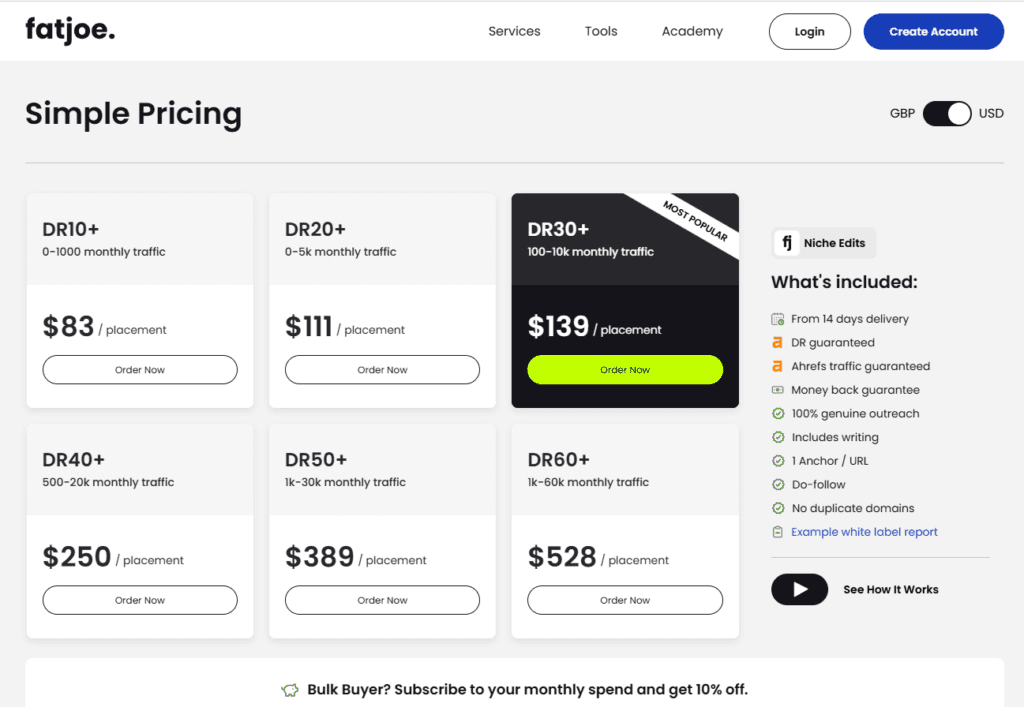
FatJoe has gathered a fair number of excellent reviews on Trustpilot, where they currently hold a 4.8-star rating.
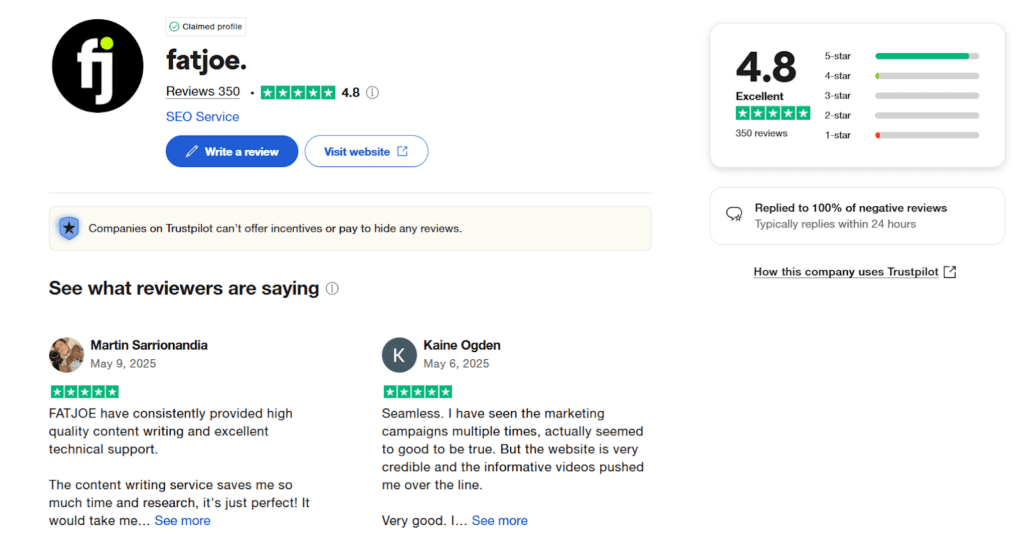
4. RhinoRank
RhinoRank focuses on manual acquisition of relevant, natural niche edits, which they call “Curated Links”.
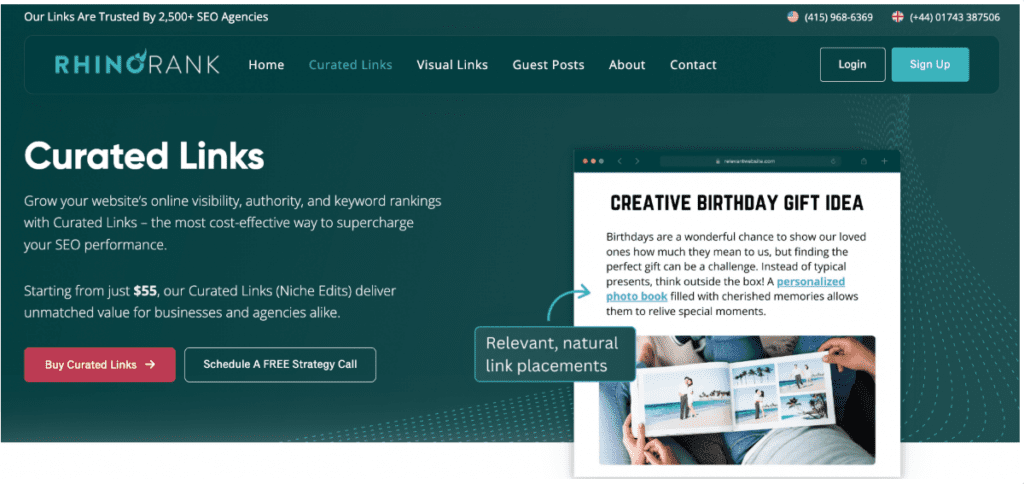
RhinoRank’s website highlights their 5-step outreach process and a dedicated QC team that ensures every link meets strict standards for quality and relevance before it’s built.
Their pricing varies based on metrics like Referring Domains (RD) and average Domain Authority (DA); for instance, a link from a site with 1K+ RDs and an average DA of 40+ is priced at $200.
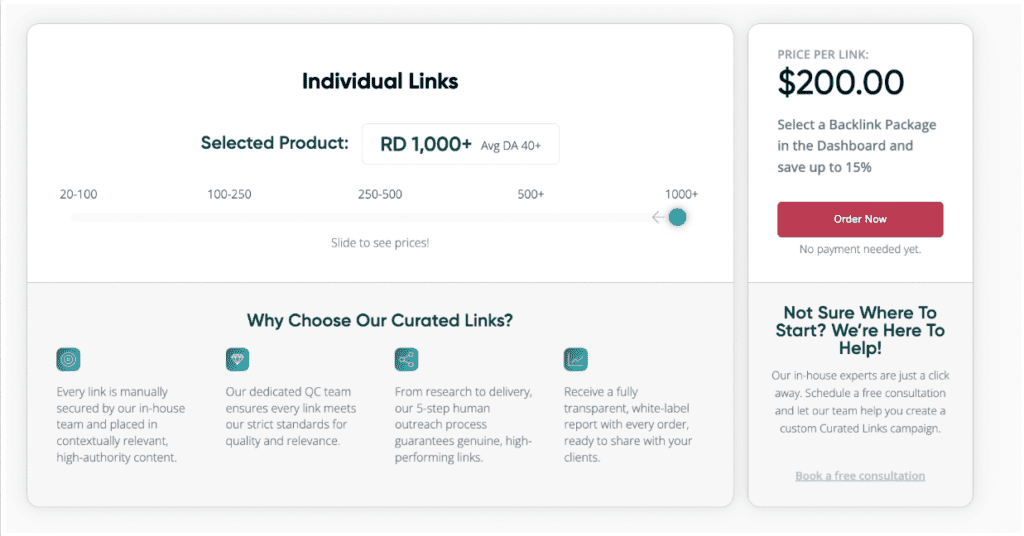
RhinoRank has a strong presence on Trustpilot, with a 4.7-star rating from over 140 reviews.
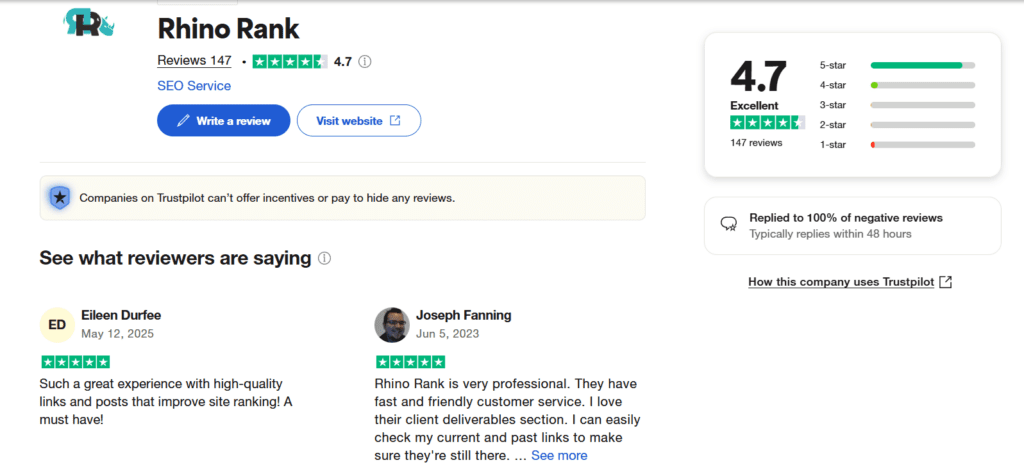
5. StellarSEO
StellarSEO is an established SEO agency offering link-building services, including niche edit insertions.
Their key selling point? Using real outreach to achieve real placements and deliver tangible results.
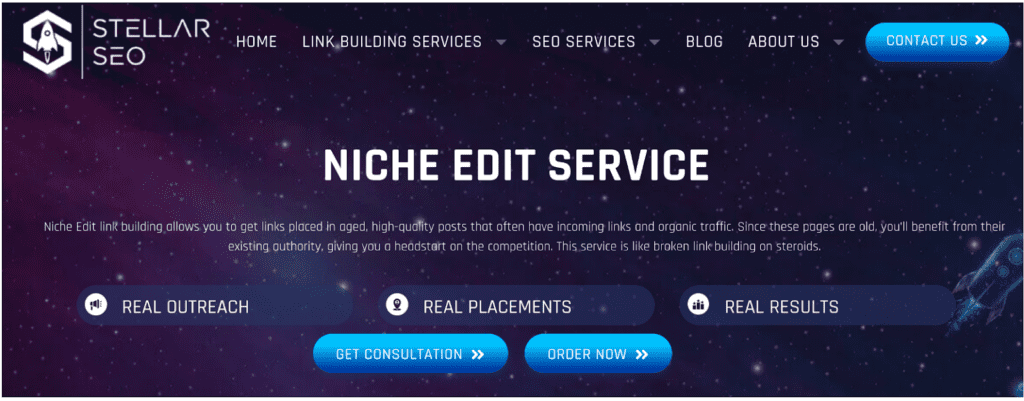
A distinctive aspect of StellarSEO's niche edit offering is their pricing philosophy: they believe relevancy is the single most important factor — more than DA or DR or any other 3rd party metric.
Consequently, all their niche edit links cost the same: $225.
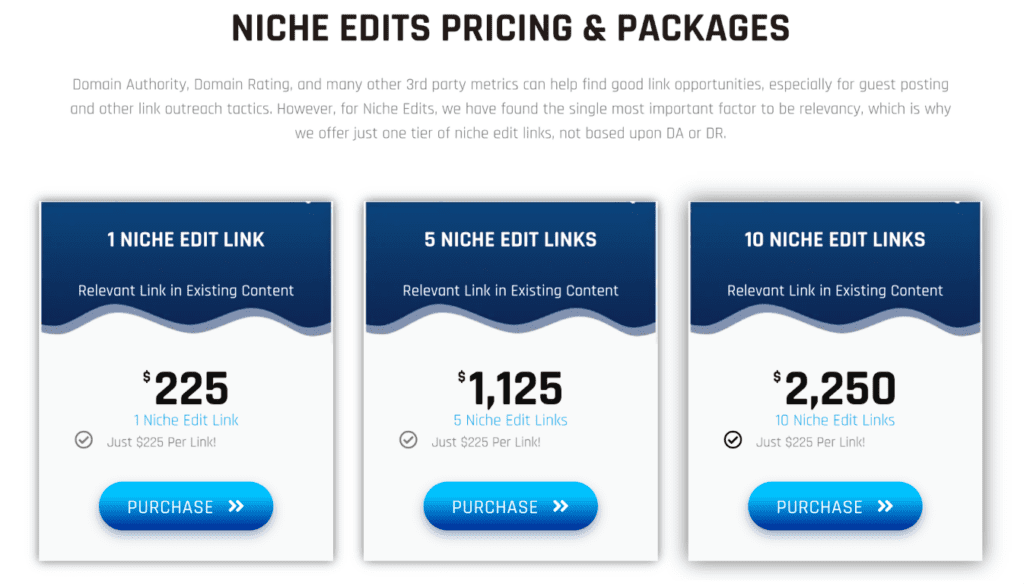
StellarSEO is a 2024 INC 5000 honoree and has built a reputation for custom outreach campaigns. You can find client reviews and more about their work on their Clutch profile.

Niche Edits FAQ
To finish, let me answer some of the most frequently asked questions about niche edits.
What are niche edits?
Niche edits, also known as "link insertions" or "curated links," are backlinks strategically placed into existing, already published content on external websites.
Here’s an example of a niche edit we’ve secured in a Woostify article (DR90). The section discusses the importance of link relevancy and links back to our article on the topic.
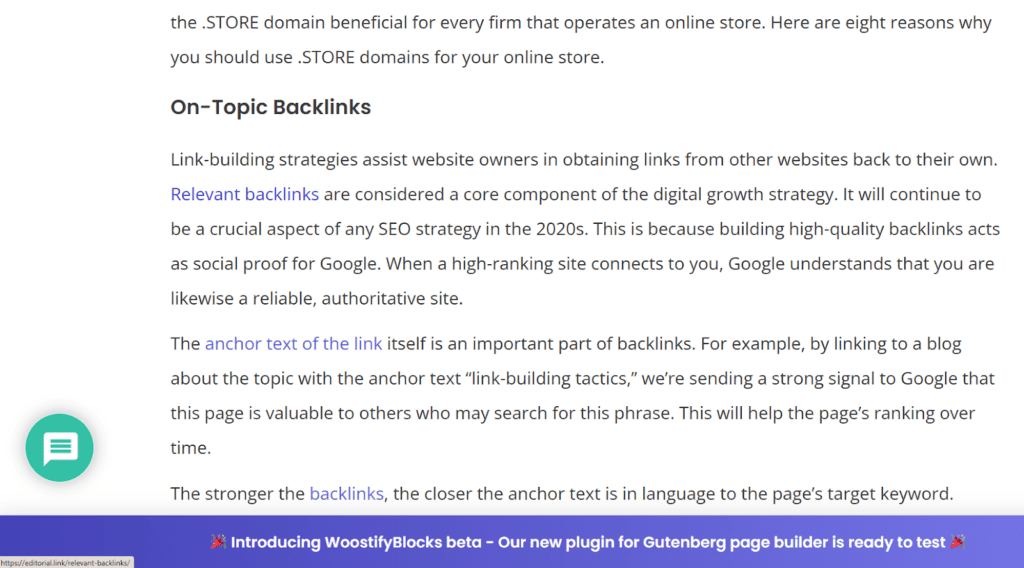
The primary goal of niche edits?
Just like any other link, they strengthen your website's backlink profile and search engine rankings. They do it by tapping into the pre-existing authority of the host page, without the need to create new content specifically for the link.
How do niche edits work?
The process starts with prospecting.
You can find relevant websites using Google search operators or an SEO tool like Ahrefs or Semrush.
For example, I use Ahrefs Content Explorer to identify articles that include the exact anchor text I’d like to place in the article. Such content requires minimal editing, making it easier for the owner to add the link.
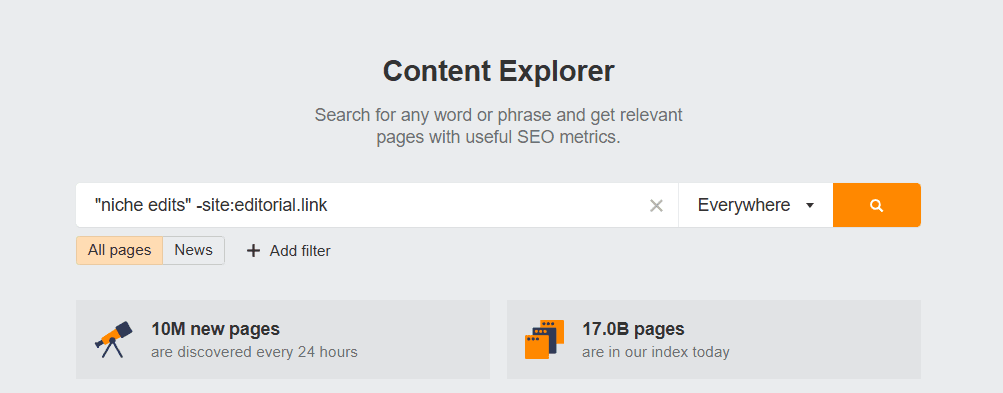
The key advantage of using Ahrefs over Google is that I can filter the results to narrow the selection before exporting the whole list into a spreadsheet.
I usually look for pages with DR30+, 100+ page traffic, 1000+ page traffic, and 1200+ word count (to find blog posts).

Once you have your prospect list, you contact the webmasters and website owners to pitch the insertions.
When they respond, you negotiate the terms of the placement. This often involves a fee or other kind of incentive (which, mind you, is against search engine policies).
When the link goes live, you need to monitor its performance — for example, the referral traffic it brings to your website — and ensure it stays live.
Benefits of niche edits backlinks
Niche edits offer several compelling SEO benefits.
A primary advantage is the quicker SEO boost because the links are placed on indexed pages that rank and attract traffic. This can lead to faster ranking improvements compared to links in new content.
Niche edits can also be more cost-effective and time-saving than guest posting, as they typically don't require extensive new content creation.
Finally, relevant niche edits can drive targeted referral traffic from users interested in the topic.
Are niche edits an ethical link-building strategy?
Experts don’t exactly agree on the ethical standing of niche edits.
For some, they’re a scheme designed to manipulate rankings, just like link exchanges or PBNs. These are against Google's spam policies, especially as you often have to pay for the links.
If you go with that interpretation, all link-building is unethical.
Most SEOs hold a more moderate position: niche edits can be ethical if they’re relevant and add value for the readers.
Also, how you secure these links matters. There’s nothing wrong with niche edits when you approach the website owner and they agree to include it. Hacking websites or including hidden links without authorization is a big no-no.
For example, many link builders know that the webmaster is unlikely to agree to insert a link, so they approach content writers, hoping to get placements in the articles they produce for their clients.
Is it safe to buy niche edits in 2025?
As mentioned, buying links is against search engine guidelines. That’s why there’s always a risk that your website gets demoted or even deindexed.
Having said that, niche edits are some of the safest links out there.
First, they look natural in the text, and search engines have no reliable way to determine if the editor got incentivized to include them.
Of course, penalties aren’t the only risk. Niche edits from irrelevant websites or with irrelevant anchor text can confuse search engines about your website content and bring down your rankings as a result.
However, when done well, niche edits are relevant, so this risk is low.
There’s always a possibility that the website you buy your link from disappears. That means no link juice and a dent in your SEO budget.
There’s not much you can do when it happens, so always make the effort to find established websites with organic traffic.
Or use a reputable link-building service specializing in niche edits to do it for you.
How much do niche edits cost?
The cost of niche edits varies significantly based on several factors, primarily the authority of the linking website, often measured by Domain Rating/DR or Domain Authority/DA, and the amount of organic traffic the site receives.
For instance, a link from a DR30+ site might cost around $150, while a link from a DR60+ site could be $500 or more.
Not all vendors offer tiered pricing. At Editorial.Link, all links cost $350 — regardless of the websites’ DR or traffic.
Fully-managed services charge more for their links because of the extra work they put into prospecting, outreach, and negotiation. Backlink marketplaces, on the other hand, are considerably cheaper.
Other elements influencing price include niche competitiveness and general market demand. For example, gambling links are way more expensive because the sector is super-profitable but highly unethical, and not many websites want to link to casinos.
How do I choose the best service to buy niche edits?
Here are some factors to consider when choosing the niche edit provider:
📦 Marketplace vs. a managed service: Buying niche edits from a marketplace is normally cheaper, but you pick the websites yourself. This requires an understanding of SEO and a link-building strategy in place. If you haven’t got those, a managed service will work better.
🧰 Features and benefits: If you’re going with a marketplace, check their dashboard, payment methods, refund policy, and if they have relevant placements in their database. For a managed service, focus on its unique benefits. For example, Editorial.Link allows clients to pre-approve placements before the team builds them.
📈 Track record and reputation: If you opt for a managed service, look for one with experience in your niche and evidence to back it up. Check their case studies, client testimonials, and reviews. Better yet, check the links they built for others yourself in Ahrefs, Semrush, or whatever tool you choose.
🔍 Processes: When looking at marketplaces, consider how they verify their vendors before they list their websites. For agencies, ask about their prospecting and outreach tactics. Avoid those that use unethical tactics, like hacking, and dodgy websites (PBNs, link farms).
🔐 Security: When using a marketplace, you will normally add funds to your account before making purchases, so check their security measures to ensure your money is safe.
✅ Guarantees: What happens when the vendor removes the link? Or their website disappears? Before you commit, check their guarantee policies. At Editorial.Link, we restore or replace lost links free of charge for 6 months after placement.
How many niche edits should I buy per month?
There's no universal number for how many niche edits to buy monthly. The optimal link acquisition velocity depends on:
🎯 Niche: If you’re in SaaS or marketing (SEO, link-building), you might need 20–30 links a month. In contrast, 2–4 targeted links per month are often enough for local businesses.
📅 Website age: Established websites can acquire links faster than new ones.
📝 Content strategy: The more content you publish, the more links you need. But also, the easier and safer it is to acquire them.
🧩 Other link-building efforts: Niche edits shouldn’t be the only links you invest in. To build a healthy link profile, diversify your tactics.
💰 Budget: How much can you invest?
A couple of things to bear in mind:
1) Link acquisition velocity must be natural. Aggressively acquiring too many links too quickly is a red flag and can get you on a search engine’s watchlist. Focus on a steady, sustainable approach that complements your site's organic growth.
2) Prioritize link quality over quantity. A few high-quality, highly relevant links from authoritative domains will have a greater positive impact than many low-quality ones.
Final Words
Using a reputable niche edit service will help you accelerate your SEO efforts by cutting out the more resource-intensive parts of link acquisition: prospecting, outreach, and negotiations.
And if you work with a link-building agency, they will also help you make strategic decisions: which pages to build links to, what referring domains will deliver the best value, and how many links you need.


